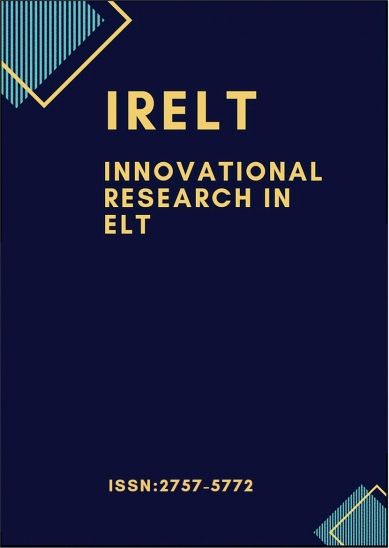Research article | Open Access
Innovational Research in ELT 2023, Vol. 4(1) 47-59
An Investigation of Teacher Perceptions about Training on Online Foreign Language Education
pp. 47 - 59 | DOI: https://doi.org/10.29329/irelt.2023.558.4
Publish Date: June 19, 2023 | Single/Total View: 171/921 | Single/Total Download: 231/1.462
Abstract
Technological advancements have prominently affected foreign language (FL) education. From the early uses of cassette-players to personal laptops and mobile phones, educational technologies have played a transformative role in FL classes through several contributions they have made to foster student achievement including increased motivation, better engagement with learning tasks, and more personalized and meaningful learning. Nevertheless, teachers as the change agents in the classroom feature to be a highly ignored stakeholder in this transformation. Given critical functions that teachers perform in the plan and design of lessons, training teachers for appropriate and maximal integration of educational technologies into FL classes still forms the ‘missing piece of the jigsaw'. Expanding on the extensive experience with educational technologies use during the Covid-19 pandemic, the present study investigated in-service FL teachers' perceptions about a training program they voluntarily joined to gain and promote their awareness about educational technologies integration into FL classes. Designed as a descriptive study, the present study used qualitative methodologies to collect and analyze data. Delving into FL teachers' perceptions of educational technologies in line with the training program they joined, the present study shed light on perceived weaknesses and strengths of online FL education apart from possible insider suggestions to improve it.
Keywords: Educational technologies, in-service teachers, insider, strength, weakness
APA 7th edition
Capan, S.A. (2023). An Investigation of Teacher Perceptions about Training on Online Foreign Language Education. Innovational Research in ELT, 4(1), 47-59. https://doi.org/10.29329/irelt.2023.558.4
Harvard
Capan, S. (2023). An Investigation of Teacher Perceptions about Training on Online Foreign Language Education. Innovational Research in ELT, 4(1), pp. 47-59.
Chicago 16th edition
Capan, Seyit Ahmet (2023). "An Investigation of Teacher Perceptions about Training on Online Foreign Language Education". Innovational Research in ELT 4 (1):47-59. https://doi.org/10.29329/irelt.2023.558.4
Al-Samiri, R. A. (2020). English Language Teaching in Saudi Arabia in Response to the COVID-19 Pandemic: Challenges and Positive Outcomes. Arab World English Journal Special Issue on Covid 19 Challenges, 1, 147-159.
Banditvilai, C. (2016). Enhancing Students’ Language Skills through Blended Learning. The Electronic Journal of e-Learning, 14(3), 220-229.
Bozkurt, A., & Sharma, R. C. (2020). Emergency remote teaching in a time of global crisis due to CoronaVirus pandemic. Asian Journal of Distance Education, 15(1), 1-6.
Canals, L., & Al-Rawashdeh, A. (2019). Teacher Training and Teachers’ Attitudes towards Educational Technology in the Deployment of Online English Language Courses in Jordan. Computer Assisted Language Learning, 32(7), 639-664.
Charmaz, K. (2006). Constructing Grounded Theory: A Practical Guide through Qualitative Analysis. Sage.
Coman, C., Tiru, L. G., Meseşan-Schmitz, L., Stanciu, C., & Bularca, M. C. (2020). Online Teaching and Learning in Higher Education during the Coronavirus Pandemic: Students’ Perspective. Sustainability, 12(10367), 1-24.
Innovational Research in ELT, Volume 4, Issue 1, 2023
59
Dahmash, N. B. (2020). ‘I couldn’t Join the Session’: Benefits and challenges of blended learning amid COVID-19 from EFL Students. International Journal of English Linguistics, 10(5), 221-230.
Demir, B., & Walker, S. L. (2022). Psychosocial learning environments: EFL learners’ voices during a pandemic. English Language Teaching Educational Journal, 5(1). https://doi.org/10.12928/eltej.v5i1.5770
Doghonadze, N., Aliyev, A., Halawachy, H., Knodel, L., & Adedoyin, A. S. (2020). The Degree of Readiness to Total Distance Learning in the Face of COVID-19- Teachers’ View (Case of Azerbaijan, Georgia, Iraq, Nigeria, UK and Ukraine). Journal of Education in Black Sea Region, 5(2), 2-41.
Evişen, N., Akyılmaz, Ö., & Torun, Y. (2020). A Case Study of University EFL Preparatory Class Students’ Attitudes towards Online Learning during Covid-19 in Turkey. Gaziantep University Journal of Educational Sciences, 4(2), 73-93.
Hakim, B. (2020). Technology integrated online classrooms and the challenges faced by the EFL teachers in Saudi Arabia during the COVID-19 Pandemic. IJALEL, 9(5), 33-39.
Hartshorn, K. J., & McMurry, B. L. (2020). The Effects of the COVID-19 Pandemic on ESL Learners and TESOL Practitioners in the United States. International Journal of TESOL Studies, 2(2), 140-156.
König, J., Jager-Biela, D. J., & Glutsch, N. (2020). Adapting to online teaching during COVID-19 school closure: Teacher education and teacher competence effects among early career teachers in Germany. European Journal of Teacher Education, 43(4), 608-622.
OECD. (2020). Education responses to COVID-19: Embracing digital learning and online collaboration. Available at: https://www.oecd.org/coronavirus/policy-responses/education-responses-to-covid-19-embracing-digital-learning-and-online-collaboration-d75eb0e8/
Ogilvie, G., & Dunn, W. (2010). Taking teacher education to task: Exploring the role of teacher education in promoting the utilization of task-based language teaching. Language Teaching Research, 14(2), 161-181.
Öztürk Karataş, T., & Tuncer, H. (2020). Sustaining language skills development of pre-service EFL teachers despite the COVID-19 interruption: A Case of emergency distance education. Sustainability, 12(8188), 1-34.
Schleicher, A. (2020). The Impact of COVID-19 on Education: Insights from education at a Glance 2020. OECD. Available at: https://www.oecd.org/education/the-impact-of-covid-19-on-education-insights-education-at-a-glance-2020.pdf
Şendoğan Erdoğan, K. (2020). Foreign language education during COVID-19 Pandemic: An evaluation from the perspective of preparatory class students. Milli Eğitim, 49 Special Issue (1), 1079-1090.
Waicekawsky, L., Laurenti, L., & Yuvero, F. (2020). Teaching ESP online during the COVID-19 Pandemic: An account of Argentinian students on this teaching modality. SHS Web of Conferences, 88, 1-8.
Zhou, L., Li, F., Wu, S., & Zhou, O. (2020). “School’s out, but class’s on”, The largest online education in the world today: Taking China’s practical exploration during the COVID-19 Epidemic prevention and control as an example. Best Evid Chin Edu, 4(2), 501-519.
